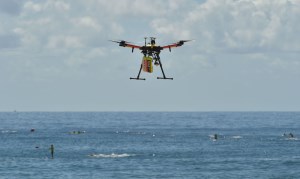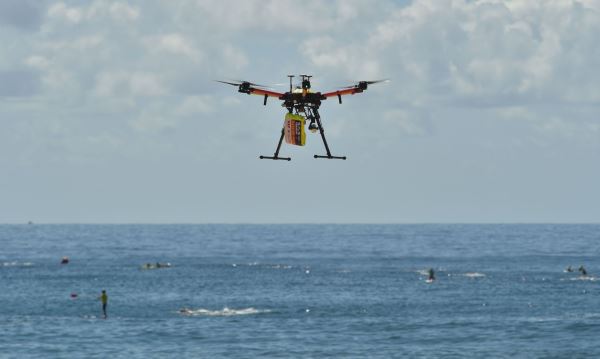SharkSpotter, an artificially intelligent shark detection system, has been recognised with an innovation award at the Australian Information industry Association (AIIA) annual iAwards.
Developed by the UTS School of Software, SharkSpotter was named national AI or Machine Learning Innovation of the Year.
The world-first software system that allows for faster reaction times to potential shark threats, was developed in partnership with The Ripper Group.
Little Ripper Lifesavers are Unmanned Aerial Vehicles (UAVs) – or better known as drones – created to react quickly and efficiently to save lives at sea.
The drones are loaded with the UTS developed SharkSpotter artificial intelligence application.
Using AI they can efficiently distinguish and identify sharks in real-time using image processing techniques, state-of-the-art sensors and software.
The automated system can detect and identify sharks as well as marine life/objects using cutting-edge deep learning neural networks and image processing techniques.
Live video feeds
“Deep learning algorithms and image processing techniques examine live video feeds from the drones at sea to detect the presence of sharks and their potential threat to water users,” said Dr Nabin Sharma, from the Centre of Artificial Intelligence in the UTS School of Software.
“The system has 90 per cent accuracy in detecting sharks,” she said.
It can distinguish between them and 16 other categories of marine life such as dolphins, rays and whales. It can also identify surfers, swimmers, boats, human beings and other objects in the water.
“This visual information is relayed immediately for interpretation to emergency services, beach lifeguards, and water users for appropriate decision-making,” said Dr Sharma.
“Information is sent to a control station on the beach where a human responder will have final say on what action to take.”
Maintaining safer conditions for swimmers
The responder may decide to continue to monitor the shark to see if it moves away from swimmers or, if it appears to become a direct threat, to sound alarms and advise evacuation.
"SharkSpotter is a great example of how an AI application assists humans as it has significantly higher rates of visual accuracy in shark detection than we have, at 90 per cent,” said Dr Sharma.
“At this level of accuracy the drone will certainly help us to improve detection rates, and to maintain safer conditions for water users.”
SharkSpotter is already deployed at dozens of beaches in Queensland and NSW.
Local councils and surf lifesaving bodies throughout Australia have expressed interest in the new technology.


